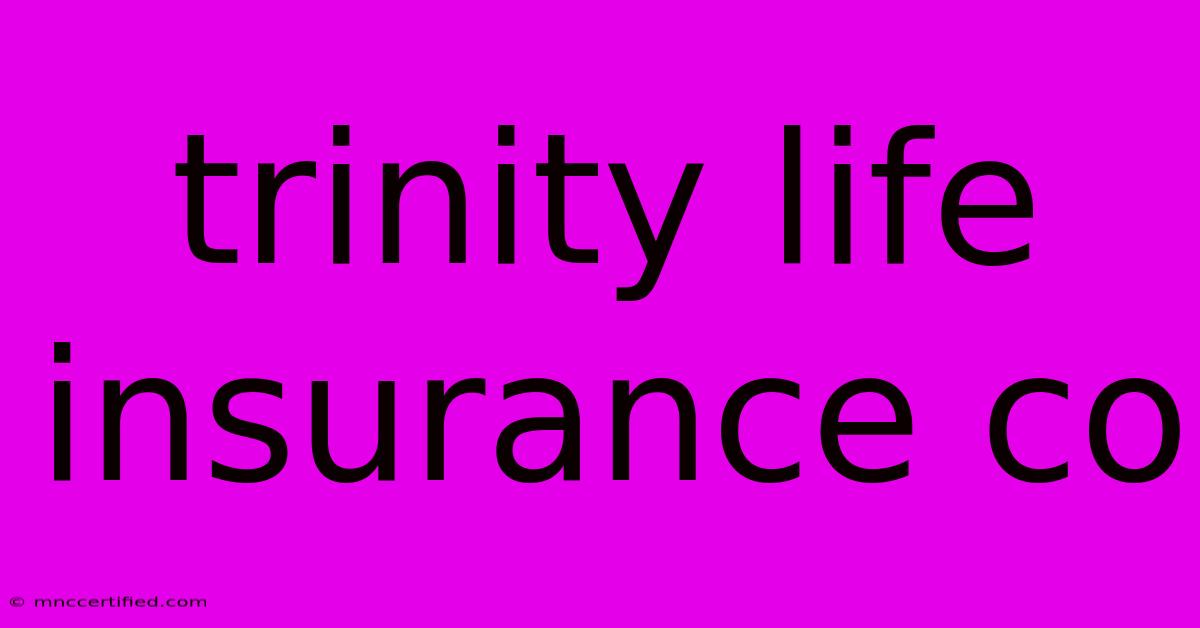Trinity Life Insurance Co

Table of Contents
Trinity Life Insurance Co: A Comprehensive Review
Trinity Life Insurance Company is not a widely known, large national company like some of its competitors. Understanding its specific offerings and target market is crucial before considering its policies. This article provides a comprehensive review of Trinity Life Insurance Co., exploring its strengths, weaknesses, and overall suitability for various insurance needs. We'll delve into crucial aspects to help you determine if Trinity Life is the right fit for your financial security. Remember to conduct your own thorough research and consult with a qualified insurance professional before making any decisions.
Understanding Trinity Life Insurance Co.'s Focus
Trinity Life Insurance Co., unlike massive conglomerates, likely operates on a more localized or niche basis. This means their product offerings and customer service approach may differ significantly. To get a true understanding of their specific services, it's essential to:
- Visit their official website: Look for detailed policy information, including coverage options, premiums, and exclusions.
- Contact them directly: Call or email to inquire about specific products and their suitability for your circumstances. A personal conversation can answer many questions a website can't.
- Read independent reviews: Search for unbiased reviews from policyholders to gain insights into their experiences with claims processing, customer service, and overall satisfaction.
While specific details on Trinity Life's product offerings require direct research on their official channels, we can discuss general aspects of life insurance to help you frame your inquiries.
Key Aspects of Life Insurance to Consider When Evaluating Trinity Life
Before engaging with any life insurance company, including Trinity Life Insurance Co., it's crucial to understand the different types of life insurance and how they work. The major types include:
Term Life Insurance: Temporary Coverage
- Definition: Provides coverage for a specified period (term), typically 10, 20, or 30 years. Premiums are generally lower than permanent life insurance.
- Pros: Affordable, straightforward coverage for a defined period, suitable for temporary needs like mortgage protection.
- Cons: No cash value accumulation, coverage expires at the end of the term.
Whole Life Insurance: Permanent Coverage
- Definition: Offers lifelong coverage, building cash value that grows tax-deferred. Premiums are typically higher than term life insurance.
- Pros: Permanent coverage, cash value accumulation, potential for loans against the cash value.
- Cons: Higher premiums, complex policy features, potentially less favorable returns compared to other investments.
Universal Life Insurance: Flexible Premiums
- Definition: Offers a combination of permanent coverage and flexibility in premium payments.
- Pros: Flexible premiums, potential for higher cash value growth depending on market performance.
- Cons: More complex than term life insurance, potential for higher costs if not managed carefully.
Factors to Evaluate When Choosing a Life Insurance Provider
Beyond the type of policy, consider these essential factors when assessing Trinity Life or any other life insurance provider:
- Financial Strength Ratings: Check independent rating agencies like A.M. Best, Moody's, and Standard & Poor's to assess the insurer's financial stability. A higher rating indicates a lower risk of the company's inability to pay claims.
- Customer Service: Look for reviews and testimonials concerning the responsiveness and helpfulness of the customer service team.
- Claims Process: Understand their claims process and how easily claims are processed and paid.
- Policy Transparency: Ensure the policy documents are clear, concise, and easy to understand.
Finding the Right Life Insurance for Your Needs
Choosing the right life insurance policy requires careful consideration of your individual circumstances, financial goals, and risk tolerance. Consider factors such as:
- Your age and health: These factors significantly impact premium costs.
- Your family's financial needs: Determine how much coverage you need to protect your dependents in case of your death.
- Your financial goals: Do you need life insurance primarily for death benefit protection, or do you want a policy with cash value accumulation features?
Remember to compare quotes from multiple insurers before making a decision.
Conclusion: Due Diligence is Key
This article provides a framework for understanding Trinity Life Insurance Co. and the life insurance landscape. However, the specific details of Trinity Life's products and services require direct engagement with the company and thorough independent research. Prioritize comparing quotes, checking financial strength ratings, and understanding the policy terms before committing to any life insurance policy. Consulting a qualified financial advisor is highly recommended to ensure you choose the most appropriate coverage for your needs.

Thank you for visiting our website wich cover about Trinity Life Insurance Co. We hope the information provided has been useful to you. Feel free to contact us if you have any questions or need further assistance. See you next time and dont miss to bookmark.
Featured Posts
-
East Enders Characters I Player Return
Dec 10, 2024
-
David Coote Pgmol Job Lost
Dec 10, 2024
-
Henry Viiis Fifth Wife Catherine Howards Story
Dec 10, 2024
-
Ftc Refunds 72 M For Fortnite Purchases
Dec 10, 2024
-
Kraft Lake Insurance Logo
Dec 10, 2024